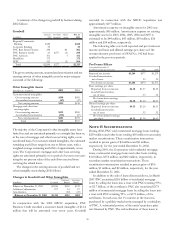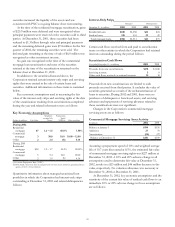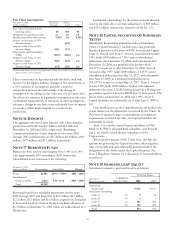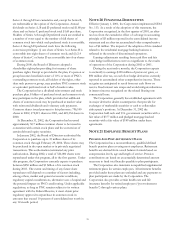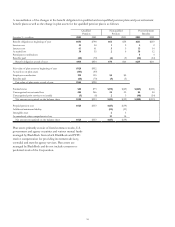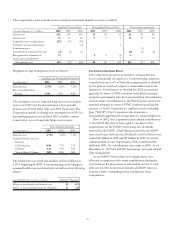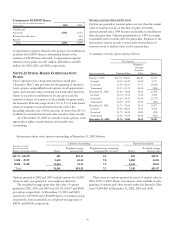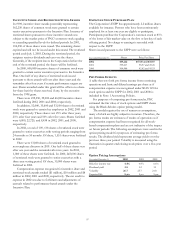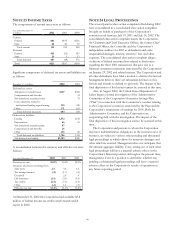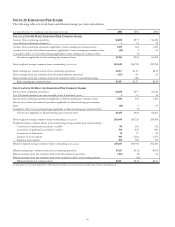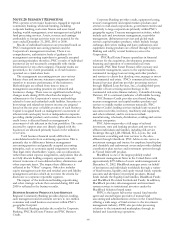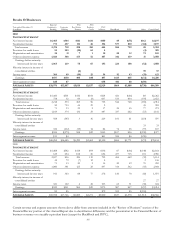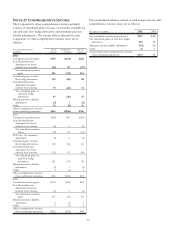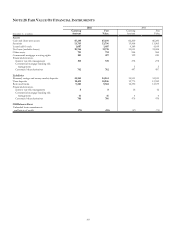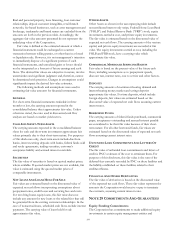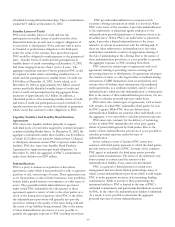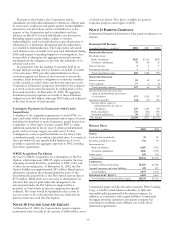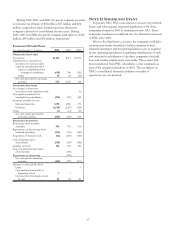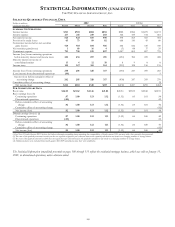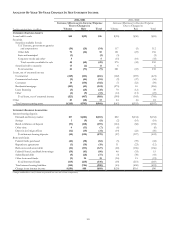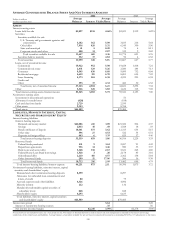PNC Bank 2002 Annual Report Download - page 102
Download and view the complete annual report
Please find page 102 of the 2002 PNC Bank annual report below. You can navigate through the pages in the report by either clicking on the pages listed below, or by using the keyword search tool below to find specific information within the annual report.100
NOTE 26 SEGMENT REPORTING
PNC operates seven major businesses engaged in regional
community banking; wholesale banking, including
corporate banking, real estate finance and asset-based
lending; wealth management; asset management and global
fund processing services. Assets, revenue and earnings
attributable to foreign activities were not material for the
years ended December 31, 2002, 2001 or 2000.
Results of individual businesses are presented based on
PNC’s management accounting practices and the
Corporation’s management structure. There is no
comprehensive, authoritative body of guidance for
management accounting equivalent to generally accepted
accounting principles; therefore, PNC’s results of individual
businesses are not necessarily comparable with similar
information for any other company. Financial results are
presented, to the extent practicable, as if each business
operated on a stand-alone basis.
The management accounting process uses various
balance sheet and income statement assignments and
transfers to measure performance of the businesses.
Methodologies are refined from time to time as
management accounting practices are enhanced and
businesses change. There were no significant methodology
changes made during 2002 other than the impact of
refinements to the Corporation’s reserve methodology
related to loans and unfunded credit facilities. Securities or
borrowings and related net interest income are assigned
based on the net asset or liability position of each business.
Capital is assigned based on management’s assessment of
inherent risks and equity levels at independent companies
providing similar products and services. The allowance for
credit losses is allocated based on management’s
assessment of risk inherent in the loan portfolios. The costs
incurred by support areas not directly aligned with the
businesses are allocated primarily based on the utilization
of services.
Total business financial results differ from
consolidated results from continuing operations. This is
primarily due to differences between management
accounting practices and generally accepted accounting
principles, such as economic capital assignments rather
than legal entity shareholders’ equity, unit cost allocations
rather than actual expense assignments, and policies that do
not fully allocate holding company expenses; minority
interest in income of consolidated entities; eliminations and
other corporate items. The impact these differences is
reflected in the “Other” category. Other also includes
equity management activities and residual asset and liability
management activities which do not meet the criteria for
disclosure as a separate reportable segment.
The impact of the institutional lending repositioning
and other strategic actions that occurred during 2001 and
2000 is reflected in the business results.
BUSINESS SEGMENT PRODUCTS AND SERVICES
Regional Community Banking provides deposit, lending,
cash management and investment services to two million
consumer and small business customers within PNC’s
geographic footprint.
Wholesale Banking includes the results for Corporate
Banking, PNC Real Estate Finance and PNC Business
Credit.
Corporate Banking provides credit, equipment leasing,
treasury management and capital markets products and
services to mid-sized corporations, government entities and
selectively to large corporations primarily within PNC’s
geographic region. Treasury management activities, which
include cash and investment management, receivables
management, disbursement services and global trade
services; capital markets products, which include foreign
exchange, derivatives trading and loan syndications; and
equipment leasing products are offered through Corporate
Banking and sold by several businesses across the
Corporation.
PNC Real Estate Finance specializes in financial
solutions for the acquisition, development, permanent
financing and operation of commercial real estate
nationally. PNC Real Estate Finance offers treasury and
investment management, access to the capital markets,
commercial mortgage loan servicing and other products
and services to clients that develop, own, manage or invest
in commercial real estate. PNC’s commercial real estate
financial services platform provides processing services
through Midland Loan Services, Inc., a leading third-party
provider of loan servicing and technology to the
commercial real estate finance industry. Columbia Housing
Partners, LP is a national syndicator of affordable housing.
PNC Business Credit provides asset-based lending,
treasury management and capital markets products and
services to middle market customers nationally. PNC
Business Credit’s lending services include loans secured by
accounts receivable, inventory, machinery and equipment,
and other collateral, and its customers include
manufacturing, wholesale, distribution, retailing and service
industry companies.
PNC Advisors provides a full range of tailored
investment, trust and banking products and services to
affluent individuals and families, including full-service
brokerage through J.J.B. Hilliard, W.L. Lyons, Inc. and
investment consulting and trust services to the ultra-
affluent through Hawthorn. PNC Advisors also serves as
investment manager and trustee for employee benefit plans
and charitable and endowment assets and provides defined
contribution plan services and investment options through
its Vested Interest product.
BlackRock is one of the largest publicly traded
investment management firms in the United States with
approximately $273 billion of assets under management at
December 31, 2002. BlackRock manages assets on behalf
of institutions and individuals worldwide through a variety
of fixed income, liquidity and equity mutual funds, separate
accounts and alternative investment products. Mutual
funds include the flagship fund families, BlackRock Funds
and BlackRock Provident Institutional Funds. In addition,
BlackRock provides risk management and investment
system services to institutional investors under the
BlackRock Solutions brand name.
PFPC is the largest full-service mutual fund transfer
agent and second largest provider of mutual fund
accounting and administration services in the United States,
offering a wide range of fund services to the investment
management industry. PFPC also provides processing
solutions to the international marketplace through its
Ireland and Luxembourg operations.


